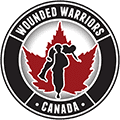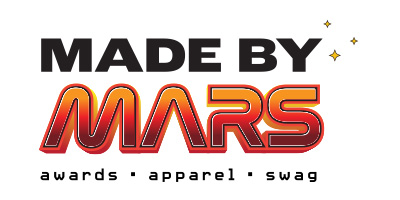Warrior Kids: Building Resilience in Youth from Families of Trauma-Exposed Professionals
An evidence-informed camp and virtual program that empowers children and youth to thrive despite the unique challenges posed by parents working as trauma-exposed professionals.
Warrior Kids: Building Resilience in Youth from Families of Trauma-Exposed Professionals
An evidence-informed camp and virtual program that empowers children and youth to thrive despite the unique challenges posed by parents working as trauma-exposed professionals.
Upcoming Programs
Warrior Kids Camp
– Spring/Summer 2025
CAMP LOCATIONS AND DATES:
Orangeville, Ontario
May 3 & 4, 2025
REGISTRATION NOW CLOSED
Kelowna, British Columbia
May 24 & 25, 2025
REGISTRATION NOW CLOSED
Edmonton, Alberta
July 3 & 4, 2025
Camp Van Es
VIRTUAL PROGRAM
– Fall 2025
WINTER VIRTUAL PROGRAM DATES AND TIMES:
Western Canada
Starts Wednesday, November 5th 2025
Kids 8-10 yrs: 5-6pm MST
Teens 11-16yrs: 6-7pm MST
Please commit to all six weeks- Dates are Nov 5, 12, 19,26, Dec 3 & 10th
Eastern Canada
Starts Monday, November 3rd, 2025
Kids 8-10 yrs: 5-6pm EST
Teens 11-16 yrs: 6-7pm EST
Please commit to all six weeks- Dates are Nov 3, 10,17,24,Dec 1,&8
- Parent Intakes will take place four weeks prior to the program starting. Your online registration is confirmation of you have secured a spot in the program.
- Warrior Kids Boxes of supplies will ship out two weeks prior to program starting. Please be sure to let us know if you can no longer attend at least 2 weeks prior to the program starting.
“I really loved that my children were with other children that are/have experienced a parent with OSI. “
“ The games and beach/lake time was what they loved. They got the most impact from the workbook time and talking about OSI’s listening to other kids stories. “
Warrior Kids Camp:
A Transformative Experience
The Warrior Kids Camp is a two-day immersive experience designed for children aged 8–16 whose parent is a Veteran or First Responder living with an Operational Stress Injury (OSI). Grounded in trauma-informed care, this camp empowers kids to build resilience, nurture self-confidence, and gain tools to thrive in the face of challenges.
Through a thoughtfully crafted clinical framework that integrates trauma-informed practices and child-centered play therapy, Warrior Kids Camp creates a safe, supportive space for healing and growth. It’s more than a camp—it’s a journey of connection and empowerment.
As part of the comprehensive Warrior Kids Program (intake, camp, and follow-up), the camp incorporates core trauma-informed principles to help kids:
- Forge Positive Peer Connections: Build friendships with others who share similar experiences.
- Understand OSIs: Gain insight into how Operational Stress Injuries impact families.
- Develop Coping Skills: Learn practical strategies to manage stress and challenges.
- Boost Self-Esteem: Discover their unique strengths and grow in confidence.
- Regulate Emotions: Build emotional awareness and resilience.
The Warrior Kids Camp is more than just a program—it’s a lifeline for youth, helping them find hope, connection, and strength to thrive.
Camp Locations
Orangeville, Ontario
May 3 & 4, 2025
Teen Ranch
The Teen Ranch is a beautiful camp in Ontario approximately 45 minutes from Toronto. Address: 20682 Hurontario St, Caledon, ON L7K 1X1. Visit teenranch.com to get a better look at the amazing property and state of the art facilities.
Kelowna, British Columbia
May 24 & 25, 2025
Green Bay Camp
Green Bay camp is located right in the heart of Kelowna, BC and perfectly situated on Lake Okanagan. Address: 1449 Green Bay Rd, West Kelowna, BC V4T 2B9. Please visit greenbay.bc.ca for details on their facilities.
Edmonton, Alberta
July 3 & 4, 2025
Camp Van Es
The Alberta Warrior Kids camp is located near Edmonton, AB and hosted at the beautiful Van Es Camp and Conference Center, 51244 Range Rd 220, Sherwood Park, AB T8E 1G9. Please visit their website vanes.ca to get acquainted with the fantastic camp facilities and location.
What To Expect After I Register for Camp
After you complete the registration form you will receive a Welcome to Warrior Kids Camp email outlining additional information about the camps including camp location; transportation and hotel information, pick up and drop off times.
Six Weeks Before Camp Date
An email will be sent out with a link asking all parents to book a Parent Only Intake Phone Call.
This Parent Intake Call is essential as it provides an opportunity to add any important information regarding your youth including emotional, behavioural and physical considerations.
Please monitor your email for this Welcome to Warrior Kids Camp, sometimes it can get redirected to junk or spam inboxes.
Discover Warrior Kids: A Virtual Resource for Families Impacted by Trauma
The Warrior Kids Virtual Program is a beacon of hope for children navigating the ripple effects of trauma caused by a Veteran or First Responder parent living with operational stress injuries such as PTSI.
Carefully crafted with clinical expertise, this program empowers families to reconnect and thrive. It focuses on strengthening the bonds that matter most—helping children and parents identify their unique family strengths, build meaningful connections, and introduce practical tools like family meetings to foster open communication and resilience.
In small, supportive groups of up to 15 participants, children aged 8–10 and 11–16 join age-appropriate sessions designed to help them feel less alone. Over six weeks of guided, one-hour virtual workshops, they’ll forge healthy peer relationships, share their experiences, and find reassurance that their family’s journey is understood and supported.
This isn’t just a program—it’s a lifeline for children and families, offering connection, understanding, and tools for a brighter future.
The message that stuck with them was “this not your fault”
” I liked being able to discuss coping methods/strategies with others, and being able to share my experiences with others “
The Warrior Kids Program
This one-of-a-kind program combines the essential knowledge around the impact operational stress injuries can have on children and youth in families with a Veteran or First Responder parent. The Warrior Kids Camp and Virtual programs consist of two formats – a 6 week psycho-educational virtual group and a two-day in person overnight camp delivered at various locations in Canada.
The programs have been developed to support children aged 8-16.
WHY WERE THE PROGRAMS CREATED?
With emergent knowledge regarding the impact of OSIs particularly concerning Post Traumatic Stress Disorder (PTSD) within military members and their families, researchers have identified children and youth of first responder-connected families (i.e. fire, police, paramedic, corrections, call center dispatchers) at risk for developing mental health difficulties as a result of their parents’ occupational stressors.
Research on military and veteran children with parents impacted by an OSI or diagnosed mental health condition shows poor parental mental health and family stressors can negatively affect a child’s mental health and wellbeing. Now more than ever, first responder families require the social work profession to intervene from a family systems framework that understands the bi-directional impact of trauma leading to negative consequences of parental OSIs on their children.
The first responder population and their families deserve unique evidence-informed prevention and intervention programs that use a holistic view such as, family stress theory to understand the unique issues connected to adverse consequences of OSIs on individual first responders and the mental health and wellbeing of their children.
(Cramm et al., 2016, Carelton, Afifi, Taillieu, et al., 2019)
Understanding the Effects of Parental Psychological Injuries on Children
“I could feel genuine sadness in her (my daughter)…I’ve had a bigger impact on her than I thought I had” (Sherman et al., 2016, p. 406).
Scholars have highlighted connections of secondary traumatic stress and negative emotional and behavioral reactions in children when a parental mental health disorder exists in the family (Cramm et al., 2016; Kelly & Paul, 2018; Sherman et al., 2016)
Over 2 million American children experienced a parent’s deployment to Afghanistan and Iraq. Literature reveals the psychological effects of the service members’ operational stressors cascades through the family system to affect children and their mental health.
(Synder et al., 2016; Foran et al., 2017,Foran, Eckford, Sinclair & Wright, 2017).).
WHO CAN ATTEND WARRIOR KIDS
Children aged 8-16 whose parent is a Canadian Armed Forces member, Veteran or First Responder (firefighter, paramedic, emergency dispatcher, correctional services worker, municipal police officer, or member of the Royal Canadian Mounted Police) can participate.
How does Warrior Kids Programs Make a Difference?
We know that change in one family member, such as a child, affects every other family member. Decades of research in areas of family functioning and traumatic stress suggest experiences of each family member can flow throughout the family system and family-centered approaches to interventions offer positive opportunities to promote mental well-being (Cramm et al., 2016; Sullivan, 2015; Wadsworth et al., 2012).
Can I register my Neurodiverse Child?
During the Parent Intake Call, Warrior Kids Directors will discuss with parents what a personalized support plan for each child would look like and consider if the child’s needs can be safely supported during the Warrior Kids Camp Program. This would include, conversation around their specific needs and preferred communication methods, medications needed during camp and any other safety considerations.
How Warrior Kids Camp Can Support Neurodiverse Youth
To support neurodiverse children at camp, it’s crucial to understand their individual needs, provide clear communication, create sensory-friendly environments, offer structured activities with options, and train staff to be responsive and adaptable to different learning styles and communication methods, ensuring they feel safe and included throughout the camp experience.
Key strategies for supporting neurodiverse children at camp:
- Pre-camp communication and planning:
- Detailed information sharing: Provide parents with comprehensive information about camp schedules, routines, activities, food options, and potential sensory triggers to manage anxieties.
- Individualized plans: During the Parent Intake Call, Warrior Kids Directors will discuss with parents what a personalized support plan for each child would look like and consider if the child’s needs can be safely supported during the Warrior Kids Camp Program. This would include, conversation around their specific needs and preferred communication methods, medications needed during camp and any other safety considerations.
Staff training: Train all camp staff on neurodiversity, recognizing signs of sensory overload, and appropriate response strategies.
Does my child/youth need to stay overnight?
Staying overnight in a new location can be stressful for many children and youth. During your Parent Intake Phone Call we will discuss any hesitations your child may have regarding staying overnight at the camp. If your child or youth does not want to stay overnight, please discuss pick up and drop off times for each camp day so your child can still maximize their time at the Warrior Kids camp and not miss out on any of the fun! Parents are asked to pick up their child from camp at a pre-determined time and will drop off their child the next morning for their child to continue their participation
Does the camp cost money?
There is no cost for each child or youth to attend the two day and one night Warrior Kids Camp. All travel and accommodations required for the family to attend camp is not covered.
Where can I stay if we travel to the camp location?
All camp locations are in central areas near a variety of hotels, beds and breakfasts for each family to choose what works for them. Many hotels offer First Responder or Military discounts.
Where can I stay if we travel to the camp location?
Yes, during your registration if you identify your child or youth has a food allergy, you will be asked to provide additional details for the catering staff to prepare ahead of time safe meal and snack options.
Meet the Warrior Kids Program Directors
DR. HELENA HAWRYLUK RSW, PhD
WARRIOR KIDS PROGRAM DIRECTOR, CO-DEVELOPER & ASSOCIATE CLINICIAN
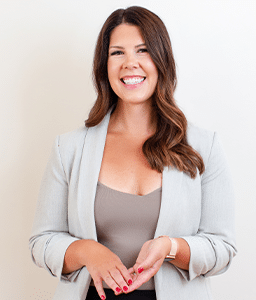 Helena completed her undergraduate degree in Psychology at Concordia University, a Bachelor of Social Work from University of Calgary, followed by her Master of Clinical Social Work and PhD with the Faculty of Social Work at University of Calgary. She has practiced as a social worker for over 15 years with families of the Canadian Armed Forces and Public Safety Personnel. Helena was awarded the Wounded Warriors Doctoral Scholarship for her research entitled “Through our Eyes”, showcasing the unique perspectives and needs of youth in military families impacted by Post Traumatic Stress Disorder, post-Afghanistan war.
Helena completed her undergraduate degree in Psychology at Concordia University, a Bachelor of Social Work from University of Calgary, followed by her Master of Clinical Social Work and PhD with the Faculty of Social Work at University of Calgary. She has practiced as a social worker for over 15 years with families of the Canadian Armed Forces and Public Safety Personnel. Helena was awarded the Wounded Warriors Doctoral Scholarship for her research entitled “Through our Eyes”, showcasing the unique perspectives and needs of youth in military families impacted by Post Traumatic Stress Disorder, post-Afghanistan war.
Helena and Jerris have been working with families of Veterans and First-Responders within Canada as clinicians, researchers and more importantly disrupters for change around designing evidence-based high quality programs for young people within the community of Trauma Exposed Professionals. Warrior Kids was designed to support youth who are living with a loved one impacted by the unique exposure to operational stress. Building healthy families starts with kids, as opposed to ends with kids. Warrior Kids is a one-of-a-kind mental health program supporting resilience in the unique lives of public safety families. As directors of the Warrior Kids Program they are honored to lead the team of camp facilitators and camp counsellors across Canada to support the youth in families impacted by operational stress injuries.
JERRIS POPIK MSW, RSW
WARRIOR KIDS PROGRAM DIRECTOR, CO-DEVELOPER & ASSOCIATE CLINICIAN
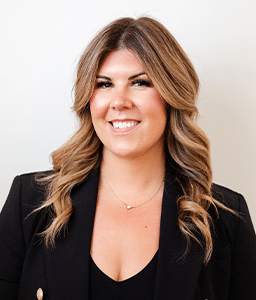 Jerris Popik, received an applied psychology degree from Concordia University and a master’s degree in clinical social work from the University of Calgary. She has practiced as a social worker for over 15 years with families of the Canadian Armed Forces and Public Safety Personnel.
Jerris Popik, received an applied psychology degree from Concordia University and a master’s degree in clinical social work from the University of Calgary. She has practiced as a social worker for over 15 years with families of the Canadian Armed Forces and Public Safety Personnel.
Helena and Jerris have been working with families of Veterans and First-Responders within Canada as clinicians, researchers and more importantly disrupters for change around designing evidence-based high quality programs for young people within the community of Trauma Exposed Professionals. Warrior Kids was designed to support youth who are living with a loved one impacted by the unique exposure to operational stress. Building healthy families starts with kids, as opposed to ends with kids. Warrior Kids is a one-of-a-kind mental health program supporting resilience in the unique lives of public safety families. As directors of the Warrior Kids Program they are honored to lead the team of camp facilitators and camp counsellors across Canada to support the youth in families impacted by operational stress injuries.
Meet the Camp Team
Thomas Giavedoni, National Camp Counsellor Team Lead
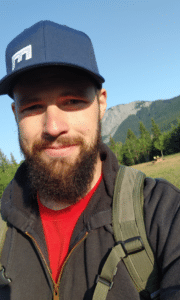 I was born and raised in Hamilton, Ontario the seventh of eight children. Started training in martial arts at the age of 14 and continued for 13 years. Went to school for general carpentry after highschool and started working with my dad doing home renovations. At 25 I opened a martial arts studio with one of my brothers after teaching for 7 years. 3 years later I decided to enter into the army so I sold my portion of the school, stopped doing renovations and joined the Canadian Armed Forces.
I was born and raised in Hamilton, Ontario the seventh of eight children. Started training in martial arts at the age of 14 and continued for 13 years. Went to school for general carpentry after highschool and started working with my dad doing home renovations. At 25 I opened a martial arts studio with one of my brothers after teaching for 7 years. 3 years later I decided to enter into the army so I sold my portion of the school, stopped doing renovations and joined the Canadian Armed Forces.
After my 9 months of training I was posted to Edmonton Garrison where I have been since December 2021.
Sara Jean, National Camp Facilitator
 Sara Jean is born and raised in Southern Ontario, and calls the small village of Tobermory on the shores of Lake Huron home. Growing up in the Great Lakes area, Sara Jean has a passion for the outdoors, which she gets to live out daily working for the Parks Canada Agency. Her love for outdoor learning drove her to obtain a Bachelor’s of Education in 2022 and she hopes to continue to fuse her two passions together. Her favourite meal is fresh fish or a burrito when she’s in the city and she considers herself an amateur historian.
Sara Jean is born and raised in Southern Ontario, and calls the small village of Tobermory on the shores of Lake Huron home. Growing up in the Great Lakes area, Sara Jean has a passion for the outdoors, which she gets to live out daily working for the Parks Canada Agency. Her love for outdoor learning drove her to obtain a Bachelor’s of Education in 2022 and she hopes to continue to fuse her two passions together. Her favourite meal is fresh fish or a burrito when she’s in the city and she considers herself an amateur historian.
Brooklyn Hull, National Camp Facilitator
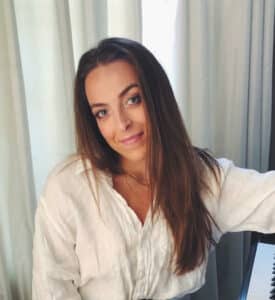 Brooklyn is a Registered Psychotherapist (Qualifying) and a Certified Music Therapist.
Brooklyn is a Registered Psychotherapist (Qualifying) and a Certified Music Therapist.
She has been a part of Wounded Warriors Canada since 2021 as both a Camp Counsellor/Facilitator while also leading Music Therapy sessions for children and youth both at camp and online during the virtual program. Brooklyn has worked with people all across the lifespan from babies to century old folks, working with neurodivergent individuals and groups, behavioral issues, grief, trauma, anxiety and depression. Brooklyn has been a caregiver to several families and children over the years and she has a passion for working with children and youth. She believes that when children feel safe and understood, they are most driven and empowered. Brooklyn is very playful and kind and encourages others to tap into their creativity as a way to build confidence, self-expression, and find passion. Brooklyn is a vocalist, and loves to sing and play the guitar. Music in all of its forms has been a gift and a tool for Brooklyn throughout her life, and she loves to share that gift with others. In her free time, Brooklyn spends her time outdoors finding new places to hike, trying new fitness classes, and spending time with friends.
Brandon Bodker, National Camp Facilitator
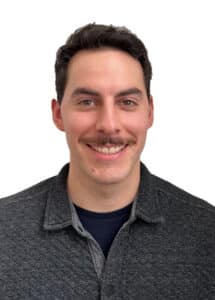 Brandon Bodker is in his final year at the University of Alberta where he is completing a Bachelor of Education Degree. While going to school, Brandon works for the Boys’ and Girls’ Club on Tuesday and Thursday evenings where he co-leads the Game Changers Program; a brand new program for boys who are waitlisted to be paired with big brothers. He also works for McMan Youth Services in their group homes as a Youth Worker. Brandon has previously led summer skateboarding camps at the YMCA for youth aged 6-12 years old and was a caseworker for the National Youth Transition Program where he had a caseload of 25 youths ranging in ages from 13-21. He has had a diverse set of experiences and not always a linear educational path – however, this is what makes Brandon relatable to the groups of youth he works and makes connections with. He prides himself as being an open-minded, empathetic person who values the importance of being intentional in understanding and listening to others. He loves people and learning about their various backgrounds and lived experiences. Outside of youth work, Brandon spends his free time skateboarding, snowboarding, working out, hunting, and anything else that gets him outdoors.
Brandon Bodker is in his final year at the University of Alberta where he is completing a Bachelor of Education Degree. While going to school, Brandon works for the Boys’ and Girls’ Club on Tuesday and Thursday evenings where he co-leads the Game Changers Program; a brand new program for boys who are waitlisted to be paired with big brothers. He also works for McMan Youth Services in their group homes as a Youth Worker. Brandon has previously led summer skateboarding camps at the YMCA for youth aged 6-12 years old and was a caseworker for the National Youth Transition Program where he had a caseload of 25 youths ranging in ages from 13-21. He has had a diverse set of experiences and not always a linear educational path – however, this is what makes Brandon relatable to the groups of youth he works and makes connections with. He prides himself as being an open-minded, empathetic person who values the importance of being intentional in understanding and listening to others. He loves people and learning about their various backgrounds and lived experiences. Outside of youth work, Brandon spends his free time skateboarding, snowboarding, working out, hunting, and anything else that gets him outdoors.
Molly Brierley, National Camp Facilitator
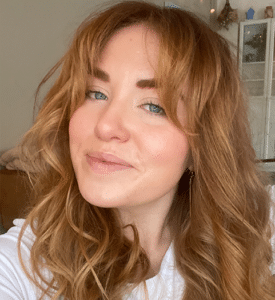 Molly Brierley is a dedicated and compassionate facilitator with extensive experience in child and youth care settings and a passion for supporting children and youth with diverse emotional needs. Having worked in both professional and volunteer capacities, Molly has honed her skills in providing social-emotional mentoring and respite care for children and youth.
Molly Brierley is a dedicated and compassionate facilitator with extensive experience in child and youth care settings and a passion for supporting children and youth with diverse emotional needs. Having worked in both professional and volunteer capacities, Molly has honed her skills in providing social-emotional mentoring and respite care for children and youth.
With five camps under her belt with Warrior Kids, Molly brings a experience in creating a nurturing environment for youth whose parents face challenges related to PTSD. Her positive attitude, reliability, and strong communication skills help her to guiding children through various camp activities and helping them build new peer relationships. With a background in social work and graphic design, Molly combines creativity with empathy, ensuring every child and youth feels supported and understood. As she continues her journey in the Social Work Degree program at University of Calgary, Molly remains committed to making a positive difference in the lives of children, youth and families facing unique circumstances.
